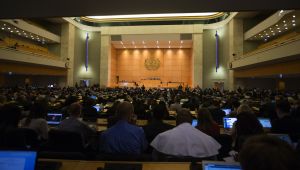Early on September 6, 2007, explosions ripped through a nondescript building near the banks of the Euphrates River, in eastern Syria. Israel's Air Force had bombed a covert nuclear reactor, which Syria was assembling to produce plutonium, with help from North Korea. Had the reactor gone critical, it would have given Syria access fissile material necessary for nuclear weapons. (The story can be found here.)
The covert nuclear cooperation between Syria and North Korea fundamentally changes the threat posed by the North Korean nuclear program.
Pyongyang's longstanding strategy is to create international crises by threatening or taking actions which the world deems dangerous, and use the resulting negotiating leverage to extract political and economic concessions to prop up a failed state. This strategy resulted in the 1994 Agreed Framework, under which the North froze the nuclear facilities at Yongbyon, in exchange for two light water power reactors and up to 500,000 tons of heavy fuel oil per year, until the reactors came on line. The United States and its allies contributed more than $2.5 billion under the deal.
Pyongyang, however, apparently had no intention to abide by the Agreed Framework or associated agreements. According to the briefing cited above, nuclear cooperation between North Korea and Syria probably began as early as 1997. In 2002, U.S. officials confronted Pyongyang with information that North Korea was pursuing uranium enrichment in violation of the Agreed Framework and other international agreements. Over the next several months, North Korea withdrew from the Nonproliferation Treaty, expelled International Atomic Energy Agency inspectors, and restarted the Yongbyon reactor. On October 9, 2006, North Korea confirmed what it had long denied, by announcing its nuclear test.
Now the North is again taking threatening actions in an effort to extract concessions. It has conducted a long range missile test under the guise of a satellite launch (violating a United Nations Security Council resolution), withdrawn from the Six Party Talks, and again expelled U.S. and UN experts monitoring the shutdown of the Yongbyon nuclear facilities.
Given the parlous condition of North Korea's economy, and of Kim Jong Il himself, one might imagine a response of malign neglect. By this logic, North Korea is a failed state surrounded by economically and militarily strong states. It is only a matter of time before it collapses under the weight of its own catastrophic and brutal policies. Secretary of State Clinton publicly speculated about the possibility of leadership change in Pyongyang during her recent trip to Asia. Perhaps we can wait for nature to take its course.
Unfortunately, the North's nuclear-armed avarice makes such a course untenable. North Korea has a long record of selling dangerous goods to despotic regimes. Ballistic missiles, narcotics, and counterfeit U.S. currency are all on North Korea's export list, often to customers also under sanctions because of their destabilizing policies. Given the North's demonstrated willingness to deal in nuclear technology, it is urgent that we act to ensure that Pyongyang's proliferation does not metastasize.
In the near term, the United States needs to deter North Korea from spreading nuclear technology further. After North Korea's 2006 nuclear test, President Bush warned that Pyongyang would be held accountable for the consequences of any illicit nuclear transfers it might make. That warning was apparently insufficient. Moreover, the new administration needs to set forth its own policy on the matter. The Obama Administration should make clear to both North Korea and China that it will hold the North fully and directly accountable for the consequences of any further nuclear transfers and that, should further transfers be revealed, the United States will vigorously pursue all possible sanctions and expect China's support.
The latter effort is important because China is North Korea's largest trade partner, most generous aid donor, and only political ally. Any pressure by the international community can be nullified or magnified to the point of decisive effect by Beijing. We need China to deter nuclear sales from the North by making clear that it will withdraw political and economic support if further sales take place.
Over the longer term, the United States should engage Beijing in a conversation about how North Korea's nuclear adventurism undermines Chinese security interests. It increases support for U.S. forces in the region, strengthens U.S. alliances with Japan and South Korea, drives U.S. and Japanese missile defense programs, which could affect China's nuclear deterrent, and might lead other states to consider the nuclear option. It is also a persistent threat to the stability that China seems to prize even more than it fears nuclear proliferation. Beijing, therefore, should be eager to end North Korea's strategy for creating crises and extracting concessions.
The consequences of illicit nuclear transfers by North Korea could far outlast Kim Jong Il's regime. Proliferation, therefore, is the real threat from North Korea, and it requires urgent attention.
Tobey, William. “The Real Threat From North Korea.” CBS, May 20, 2009




